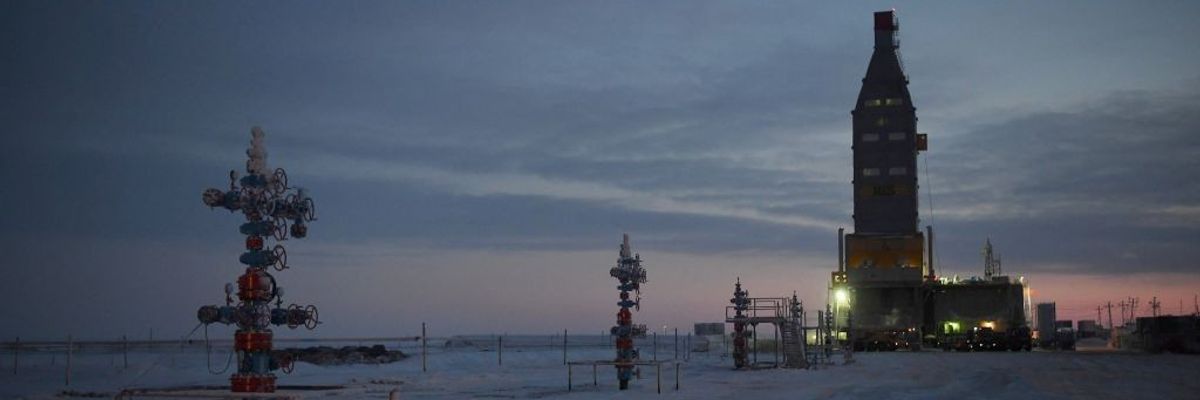Russia's aggressive expansion of its gas infrastructure in the Arctic raises alarming concerns over massive methane emissions with potentially catastrophic climate impacts. Significant moves to stop this potentially deadly sprawl were taken by the U.S. with new sanctions targeting Russian liquefied natural gas infrastructure. These sanctions not only stand to deprive Russia of its future gas export revenues and undermine its military efforts in Ukraine but also represent a crucial contribution to mitigating climate change.
The U.S. Department of the Treasury on September 14
expanded its sanctions list to include Arctic Transshipment, a Novatek-led joint venture with France's TotalEnergies, which holds a 10% interest in it. Arctic Transshipment owns two LNG floating storage units, known as Saam FSU and Koryak FSU. These are massive ships that are stationed near the Barents port of Murmansk in the north of Russia and the Kamchatka Peninsula in the far east.
The sanctions imposed to curtail the surge of Russia's liquefied natural gas to Europe are essential to strip Russia of economic resources that fuel its aggression in Ukraine. Despite Western sanctions, in 2022, Russia hit its highest current account surplus in history. The surplus in 2022 reached $227 billion, more than double the previous record ($122 billion in 2021). This surplus has been sustained by substantial profits from fossil fuel exports, which have been pivotal in funding its ongoing war in Ukraine.
Novatek's gas sprawl in the Arctic is setting a fuse to Russian carbon bombs—unlocking extraction at massive new gas fields and further gas exploration in the most climate-sensitive region on Earth.
Despite the overall
decrease in gas consumption in the E.U. and remarkable progress in the deployment of renewables, European countries boosted LNG imports by 60% in 2022 to compensate for declining pipeline gas shipments from Russia. In the first half of 2023, imports of Russian liquefied natural gas to the E.U. were the highest in the last three years.
Novatek, a private company owned by Russian oligarchs Leonid Mikhelson and Gennady Timchenko, stands as the main supplier of Russian LNG to E.U. and international markets. Both Mikhelson and Timchenko are members of Vladimir Putin's inner circle and, with the assistance of his regime, have
seized stakes in international companies involved in Russian oil and gas projects. Novatek ranks as Russia's largest private natural gas producer.
Novatek is the majority owner (50.1% shares) of Yamal LNG terminal, and is currently implementing the Arctic LNG-2 project, aimed at significantly increasing sales of Russian LNG to international markets and having the potential to double the company's export capacity.
To sell LNG to international markets, Novatek relies on transhipment services because Russia can only transport LNG through icebreaker LNG carriers via the Arctic Ocean. Russia has a limited number of these icebreaker carriers, and their operational costs are substantially higher than those of regular LNG tankers. Consequently, transhipment is a vital component of Russia's new gas export expansion plans.
According to official statements published on March 9, 2023, Russia plans to nearly triple its LNG export capacity by 2030, from the current 35 million tons per year to 100 million tons per year. Arctic LNG-2 is a critical element of these expansion plans, designed to increase the transportation and sales of Russian gas on international markets. This project, if implemented, could double the LNG export capacity of Novatek. Failing to impose an embargo on Russian LNG in the E.U. would provide Russia with additional resources to sustain its war against Ukraine, with dire climate consequences.
Novatek's gas sprawl in the Arctic is setting a fuse to Russian
carbon bombs—unlocking extraction at massive new gas fields and further gas exploration in the most climate-sensitive region on Earth. It's quite shocking that U.S. banks are among the biggest backers of these projects, despite civil society organizations urging them for years to stop financing fossil fuels and take the side of a radical shift to investment in clean energy solutions.
The
Yamal and Gydan peninsulas, where Novatek is developing its monstrous LNG megaprojects, are characterised by the saturation of the permafrost layer with methane hydrates, also known as clathrates—an unstable ice-like mixture of methane and water that forms and exists at temperatures below 4°С and pressure above 20 atmospheres.
In the early 2000s, climatologists put forward the so-called "Clathrate Gun Hypothesis"—suggesting a self-accelerating chain reaction: Rising temperatures lead to increased methane emissions from permafrost, intensifying the greenhouse effect, further destabilizing hydrates, and releasing more methane. Taking into account the findings of recent research concerning rising emissions from Yamal's methane hydrates, this hypothesis is finding terrifying confirmations. Therefore, Novatek's expansion in the Arctic could act as the trigger for the "clathrate gun," with potentially devastating consequences.
Despite sanctions, multiple investigations, and public pressure, French oil major TotalEnergies persists in buying Russian liquefied gas and maintains shares in joint ventures with
Novatek. In 2023, TotalEnergies is the second-largest purchaser of Russian LNG, purchasing over 10% of the country's shipments from the Yamal LNG terminal, which Total partly owns.
Despite public announcements to the contrary, TotalEnergy's partnership with Novatek has continued throughout 2023, with joint ventures in the Arctic advancing even as evidence emerged that
Novatek is sponsoring Russian private military units and mercenaries involved in war crimes in Ukraine. Despite alleged declarations of commitment to climate change mitigation, Total contradicts these claims by participating in the dangerous expansion of Russia's notorious gas industry.
Governments must take decisive action. In 2022, exports from Russia to the E.U. accounted for just over 3% of the global LNG market. This excludes a shocking increase in prices following the import ban and derailing of the Arctic LNG-2 because the E.U. is succeeding in reducing gas demand and substituting it with renewables as shown by
CREA's report.
There is simply no excuse for Western governments not acting to defuse Russia's gas expansion in the Arctic. They must act immediately and decisively to knock the "clathrate gun" from the bloody hands of Putin's regime. There will be no second chances.
